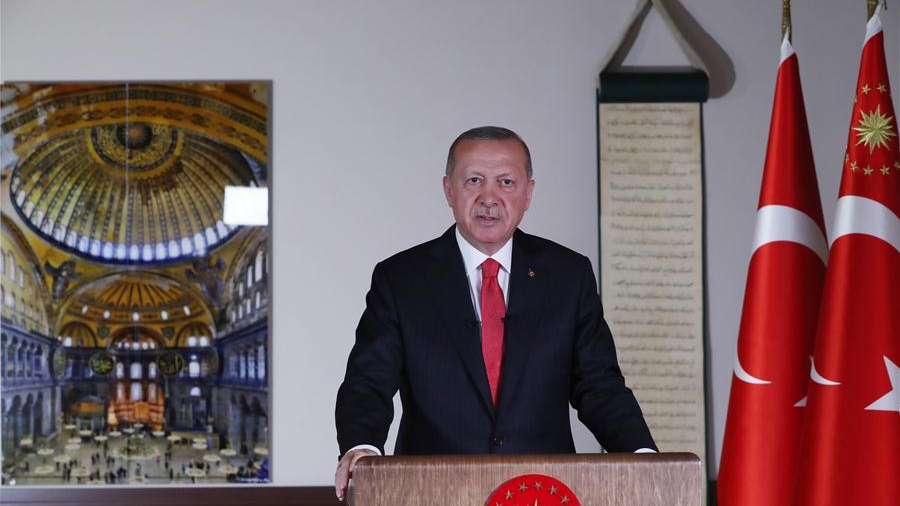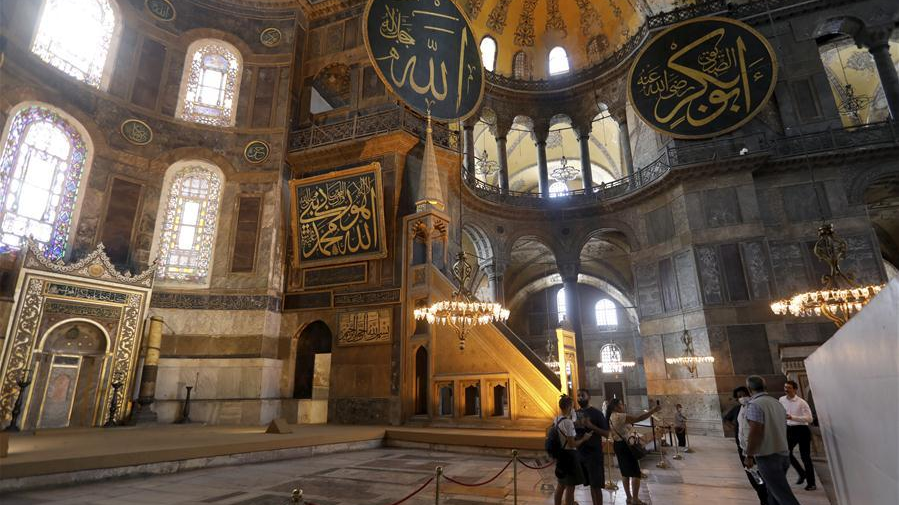
Turkish President Recep Tayyip Erdogan delivers a televised address to the nation in Ankara, Turkey, on July 10, 2020. /Xinhua
Turkish President Recep Tayyip Erdogan delivers a televised address to the nation in Ankara, Turkey, on July 10, 2020. /Xinhua
Editor's note: Lan Shunzheng is a research fellow at the Charhar Institute and a member of the Chinese Institute of Command and Control. The article reflects the author's opinions, and not necessarily the views of CGTN.
On July 10, Turkish President Recep Tayyip Erdogan officially announced that the Hagia Sophia in Istanbul will reopen to Muslims on July 24 as a mosque and transfer its management to Turkey's National Council for Religious Affairs. No doubt Mr. Erdogan's move has become a focus of global attention because of the Hagia Sophia's special status.
Hagia Sophia was built by the order of the Eastern Roman Emperor Justinian I in 532. After its completion in 537, the church became the orthodox patriarch of Constantinople (now Istanbul), the capital of the Eastern Roman Empire, and the site of royal celebrations for the Eastern Roman Empire.
For nearly 1,000 years, Hagia Sophia remained the largest Christian church in the world. It was not until the Ottomans captured Constantinople in 1453 that turned it into a mosque. In 1934, Kemal Ataturk, the secular founder of modern Turkey, turned the building into a museum.
Unsurprisingly, Erdogan's decision to turn Hagia Sophia into a mosque has caused some concern in the international Christian community.
As U.S. State Department spokesman Morgan Otagus said, "We are disappointed by the Turkish government's decision to change the status of Hagia Sophia." The French foreign minister also said his country was strongly opposed to Turkey's decision. A spokesman for the Russian Orthodox Church also condemned the act.
As for the pressure from the international community, Erdogan said that how to deal with the church is an internal affair of Turkey, and his decision is to exercise sovereign rights on behalf of the country.
Analysts say the immediate reason Erdogan is so determined to change the Hagia Sophia's status is to win over nationalist voters. Erdogan has reportedly made a point of commemorating the Ottoman defeat of the Byzantines in recent years, with big annual celebrations.
In 2018, Erdogan himself recited a Koran verse at Hagia Sophia. While the Hagia Sophia is a prominent symbol of Ottoman history, reconstructing it could help Erdogan mix favor with religious conservatives and Turkish nationalists, solidifying his power base and putting pressure on his political opponents abroad.

People visit the Hagia Sophia in Istanbul, Turkey, on July 10, 2020. /Xinhua
People visit the Hagia Sophia in Istanbul, Turkey, on July 10, 2020. /Xinhua
In addition, under the impact of COVID-19, Turkey's economy has suffered a heavy loss. According to statistics, the number of confirmed COVID-19 cases in Turkey has surpassed 215,000 on July 15.
Over the past two years, the economy has become a main weakness of Mr. Erdogan's ruling Justice and Development Party (AKP). In 2018, the lira plunged, inflation soars to 25 percent and it has triggered a recession. Last year's local elections in Turkey turned into a referendum on Erdogan's response to the crisis, and for the first time his party suffered humiliating defeats in several major cities.
This time, the International Monetary Fund (IMF) forecasts that Turkey's economy will shrink by five percent, inflation will rise to 12 percent and unemployment will rise to 17.2 percent due to COVID-19.
Some forecasts even paint a grim picture of an unemployment rate that could reach as high as 30 percent. In this perspective, Erdogan is also using the Hagia Sophia's conversion as a distraction from the economic toll of COVID-19 at home.
On a deeper level, the change of Hagia Sophia's orientation is another step towards the "Islamization" of Turkey. Modern Turkey was founded after World War I.
In 1924, Ataturk, the country's founding father, announced the abolition of the Islamic caliphate, closing religious schools, confiscating religious funds and secularizing it.
But while Turkey's secularization has long been complete, the case for re-Islamization, of which Erdogan is a staunch supporter, has not gone away.
Before joining the politics, Erdogan has been banned by the government several times for forming political parties and trumpeting Islam. But Erdogan has been outspoken in his support for Islam, publicly refusing to lay newspapers on the ground during services to show his devotion, and in 1998, he publicly eulogized religious poetry and was sentenced to 10 months in prison. This is known as the Siddhartha Event.
After becoming a president, Erdogan invigorated the Turkish economy on one hand, on the other hand pushed forward the conservative, tendency of Islamist measures, such as the development of religious schools, enlarging the rights of religious affairs, promulgating a limit on a drinking games and so on.
At the same time, restrictions on "Islamization" in Turkey have diminished in recent years. The Turkish army, for example, has been a staunch force for secularization, and it has overthrown many governments in history that have challenged secularization.
On July 15, 2016, after a military coup that wanted to interrupt the Islamization process failed, the Turkish government quickly to begin a cleansing campaign, in which thousands of military personnel and the ministry officials were cleansed for political means.
It is not hard to see that, with the converting of Hagia Sophia into a mosque, Turkey's future image of secularization will be further weakened and the Islamic state will move closer to theocracy.
(If you want to contribute and have specific expertise, please contact us at opinions@cgtn.com.)